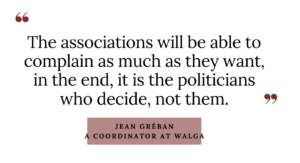As part of the European Recovery and Resilience Plan, seven of 28 Belgian projects submitted for funding are to receive aid ranging from €60,000 to €75,000 euros, for a total amount of €477,125. These seven projects highlight the artistic and creative possibilities of video games made in the Wallonia-Brussels Federation.
As in any project, the prototype phase is one of the most important. It represents the initial phase on which the whole viability of the project is based. The financial assistance that these video game projects will receive will be used in this phase: the artistic direction, the technical possibilities, the code, etc.
These projects will be evaluated by a jury on several criteria: their technical aspect, their narrative and "the measures taken by each studio to limit the ecological and environmental impact, and the attention paid to the dimensions related to equality and parity," the Centre for Cinema and Audiovisual stated.
The seven projects selected already display a lot of diversity:
- Blah: game about otherness and inclusion
- The Chronicles of Alia: game focusing on Ardennes folklore
- Faeria Legends: a fairy tale
- Draglutonny Arena: local multi-game with a witchcraft vibe
- Tamed: game where a mother is a fierce monster
- Elixirs: game with mental calculations
- 4m²: game where the prison world and its living conditions is the heart of the story
Financial benefits
While some believe this competition can provide a certain dynamism in the Belgian video game sector, the optimism is not shared by all. In the cultural field, Belgian productions can also benefit from the Tax Shelter. In a nutshell, it's a way to get a tax cut by investing in a small start-up or a small, growing business. This discount can range from 30% to 45% for the amount invested in a start-up company and 25% for growing companies.
For the moment, in the cultural field, the Tax Shelter only applies to Belgian audiovisual productions. The extension of the Tax Shelter to the video game domain will apply on January 1, 2023. But this news is not well received by some. Pieter-Jan Van De Weghe, Flemish Liberal League member, wrote in L'Écho recently that the Tax Shelter for the video game sector is a bad idea.
Van De Weghe's main point is that non-Belgian companies operating in Europe can also benefit from the Tax Shelter. This would therefore amount to a "looting of the Belgian treasury for the benefit of foreign companies," he wrote in the piece.
Van De Weghe also explains that, unlike the audiovisual sector, "there is no obligation for the video game sector to ensure that its production takes place physically on Belgian territory. [...] The work can perfectly be done remotely abroad."
However, others are more confident and convinced. Jean Gréban, a coordinator at the Wallonia Game Developers Association (WALGA), has been active in the video game industry for the past 30 years.
Post translation: "After years of epic struggle to extend the Tax Shelter, the Belgian tax mechanism to support audiovisual production, to the video game sector, an important decision has been taken by the federal and EU governments. The measure will (finally) come into force on 1 January 2023.
This is an important step, but not the last one, as the legislative process still has to go through the proposal of a modification of the law by the federal parliament, the notification to Europe and the introduction of the cultural test at the level of the Communities in charge of the approval of projects.
But all the lights are green, al levels of power are ready to move forward, in the north as well as the south of the country. The political awareness and will will allow our industry to go to the next level, there will still be epic battles to fight, but we like that in the video game industry"
WALGA's objectives are numerous: to ensure coordination between video game schools in Wallonia, to support studio projects, to support video game professions, to raise awareness of video games in the political sphere and above all, to promote the medium as a cultural element.
Cultural element status
On this last point, the battle has been tough. Indeed, Gréban explains: "The bill to extend the Tax Shelter for the video game industry dates from March 2019. At the time, and still today, many actors in the Belgian and European political sphere are against it." The main point of contention for those in opposition is that this would mean that video games are recognised as a cultural element.
For three years, therefore, this project to extend the Tax Shelter was discussed, rediscussed, negotiated, analysed and dissected. Beyond the national and European political sphere, associations in the north and south of the country had joined forces against the extension and the recognition of video games as a cultural element.
Related News
- Data hungry: Which mobile games collect the most personal info?
- Game designers understand the importance of weather when creating new worlds
- EU recovery plan: Up to €300 million in extra subsidies for Belgium
Despite this, the decision was reached last May: the extension of the Tax Shelter for video games was voted on in the Federal Government, with Europe also giving its green light. Other administrative steps only need to be validated but Gréban is confident: "The associations will be able to complain as much as they want, in the end, it is the politicians who decide, not them."
The future of Belgian video games is in the hands of its actors and politicians. It is up to them to make good use of it so that Belgium is not lagging behind its European neighbours.


